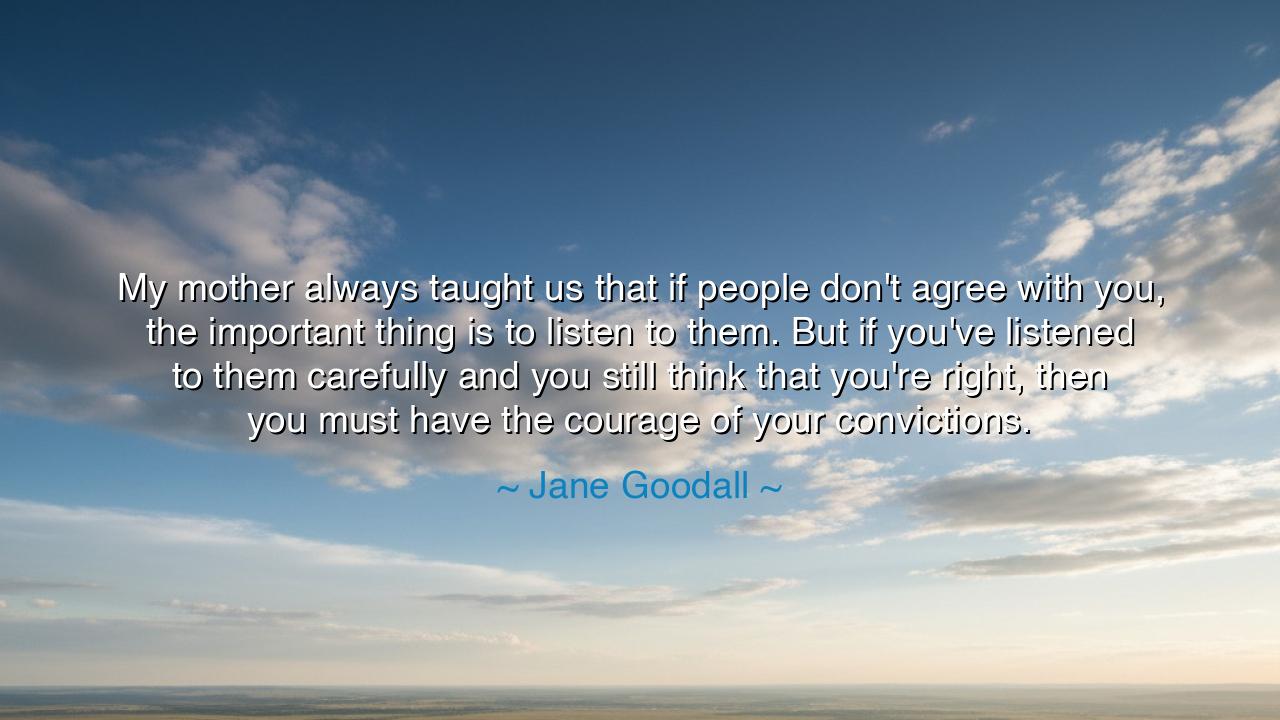
My mother always taught us that if people don't agree with you
My mother always taught us that if people don't agree with you, the important thing is to listen to them. But if you've listened to them carefully and you still think that you're right, then you must have the courage of your convictions.






In the gentle yet unwavering voice of Jane Goodall, the great observer of life and the human spirit, we find this timeless lesson: “My mother always taught us that if people don't agree with you, the important thing is to listen to them. But if you've listened to them carefully and you still think that you're right, then you must have the courage of your convictions.” These words carry the quiet strength of both wisdom and compassion. They remind us that true courage is not the loud defiance of opposition, but the calm union of understanding and conviction — to listen with humility, and yet stand firm with integrity.
The origin of this teaching lies not in the halls of academia or politics, but in the home of a mother who shaped one of the world’s most compassionate minds. Jane Goodall’s mother, Vanne Morris-Goodall, was herself a woman of grace and strength — one who taught her daughter that listening is not weakness, and conviction is not arrogance. When Jane was a young girl dreaming of studying animals in Africa — a dream many called childish or impossible for a woman of her time — her mother did not discourage her. Instead, she said, “If you really want something, you’ll have to work hard, take advantage of every opportunity, and never give up.” From her, Jane learned that listening to others was necessary, but surrendering to their doubts was not. Thus was born this dual virtue: humility in listening, and courage in belief.
This wisdom is ancient in spirit, echoing through the ages like the counsel of sages. The ancients taught that wisdom is not found in stubbornness, but in discernment — the ability to hear even one’s opponents with an open heart, yet not be swept away by the noise of the crowd. To listen carefully is to show respect for truth, for truth can reveal itself even through those who disagree with us. Yet, after hearing, when the inner voice still burns with certainty, the soul must not betray itself. That moment — when understanding meets resolve — is where courage of conviction is born.
Consider the story of Galileo Galilei, who stood before the mighty tribunal of the Church and listened to their warnings, their threats, their doubts. He heard them all — yet after hearing, he could not deny what his eyes had seen. “And yet it moves,” he murmured, speaking of the Earth beneath their feet. His listening did not weaken his belief; it refined it, tested it, and made it pure. This is the courage Goodall speaks of — not reckless defiance, but the steadfast peace of one who has listened deeply and still stands firm. The world may call it rebellion, but in truth it is integrity made visible.
In her own life, Jane Goodall lived this teaching with grace. When she first journeyed into the forests of Tanzania, the scientific establishment dismissed her methods. They said she anthropomorphized too much, that she gave animals human emotions, that her approach was “unscientific.” Yet she listened to their critiques, weighed their points, and then quietly continued her work. Her conviction — that the chimpanzees she studied were not mere instinct-driven creatures, but feeling, thinking beings — proved right. Today, her discoveries reshaped our understanding of the kinship between humans and animals. Her listening gave her clarity; her conviction gave her courage.
In these words lies a delicate balance that every generation must learn: to listen without losing oneself, and to stand firm without becoming unkind. The world is full of voices — angry, proud, and impatient. Many hear only to reply, not to understand. But to truly listen is an act of love and humility, an admission that truth is greater than any one mind. Yet to abandon one’s belief after careful thought is a betrayal of conscience. Conviction, then, is the sacred flame that guides us through confusion — the light of principle that must never be extinguished by fear or doubt.
So, my child, take this lesson to heart. When you meet those who disagree with you, listen first — listen not to argue, but to understand. Let their words test your own. If they reveal truth, accept it humbly; if not, hold to your own with quiet strength. Do not mistake arrogance for courage, nor submission for respect. True courage lies between the two — in the stillness of a heart that has heard all voices, yet follows the voice of conscience above all. For as Jane Goodall’s mother taught her — and through her, teaches us — the world does not change by stubbornness or pride, but by the brave calm of those who listen deeply, and stand firmly for what is right.






AAdministratorAdministrator
Welcome, honored guests. Please leave a comment, we will respond soon